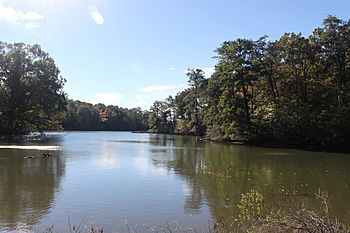St. Marys River (Maryland) facts for kids
Quick facts for kids St. Marys River |
|
|---|---|

A landscape image of the St. Marys River
|
|
| Country | United States |
| State | Maryland |
| County | St. Mary's County |
| Physical characteristics | |
| River mouth | Potomac River 0 feet (0 m) |
| Length | 22.3 miles (35.9 km) |
The St. Marys River (sometimes called St. Mary's River) is a river in southern Maryland, United States. It is about 22.3 miles (35.9 km) long. This river is an important natural feature in St. Mary's County. It flows into the Potomac River, which then leads to the Chesapeake Bay.
Contents
Where the River Flows
The St. Marys River starts in the southern part of St. Mary's County. It flows towards the southeast. Along its path, it passes through the town of Great Mills.
From River to Estuary
As the river gets closer to St. Mary's City, it starts to get much wider. Here, it turns into a special type of water body called a tidal estuary. An estuary is a place where fresh water from a river mixes with salty water from the ocean. The St. Marys River estuary is about 2 miles (3 km) wide at its widest point.
Meeting the Potomac River
The St. Marys River finally empties into the Potomac River. This meeting point is on the north bank of the Potomac. The Potomac River then flows into the Chesapeake Bay, which is a large arm of the Atlantic Ocean. This connection means the St. Marys River is part of a much larger water system.
Importance of Estuaries
Estuaries like the St. Marys River are very important natural areas. They are often called "nurseries of the sea." This is because many different kinds of plants and animals live there.
Home for Wildlife
The mix of fresh and salt water in an estuary creates a unique environment. Many fish, crabs, and shellfish use estuaries as places to lay their eggs and raise their young. Birds also visit estuaries to find food. The calm waters and rich food sources make them perfect habitats.
Protecting the River
Rivers and estuaries are vital for our environment. Keeping them clean helps protect the wildlife that lives there. It also ensures that people can enjoy activities like fishing and boating. Protecting the St. Marys River helps keep the larger Chesapeake Bay healthy too.
 | Dorothy Vaughan |
 | Charles Henry Turner |
 | Hildrus Poindexter |
 | Henry Cecil McBay |

